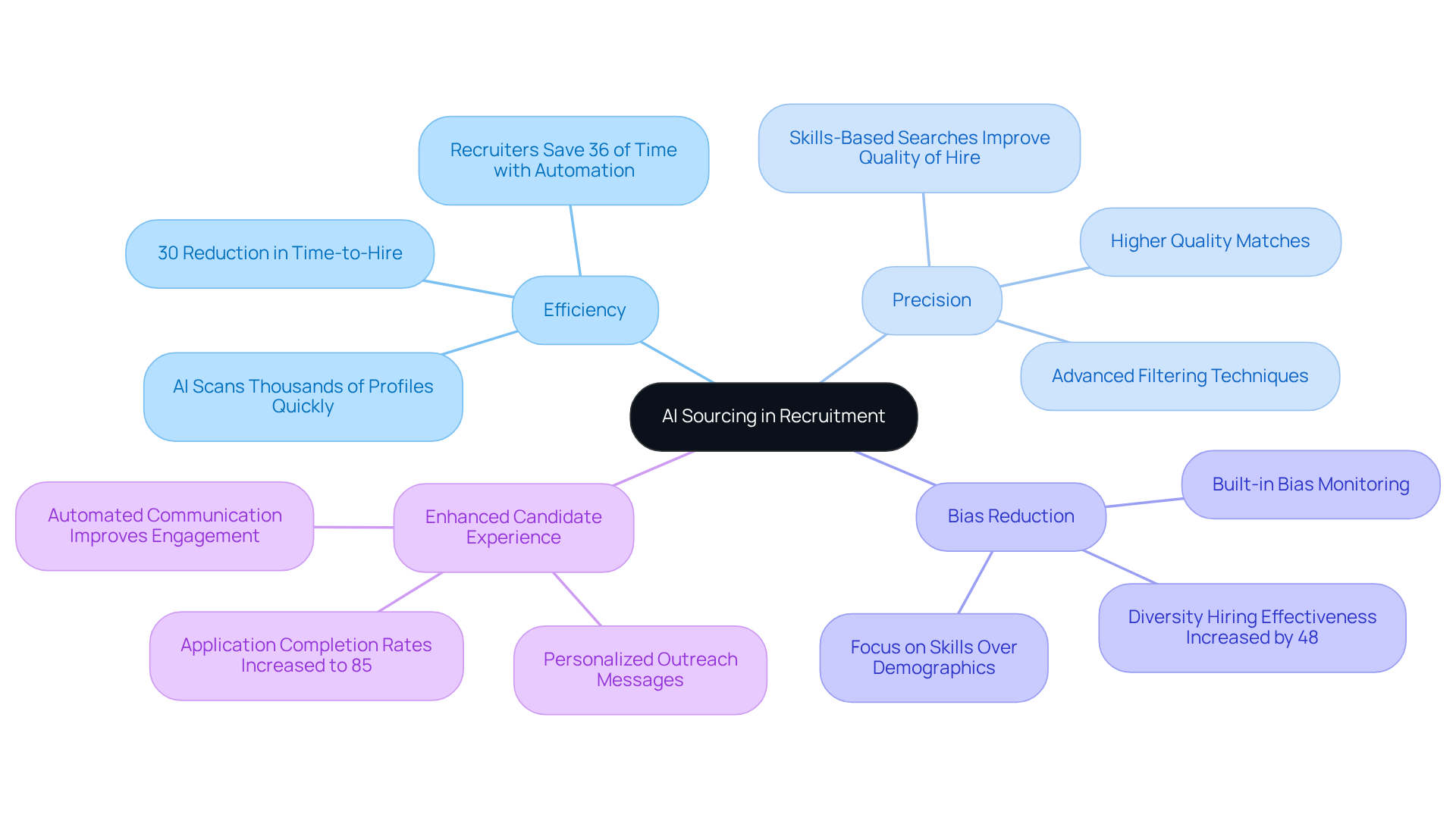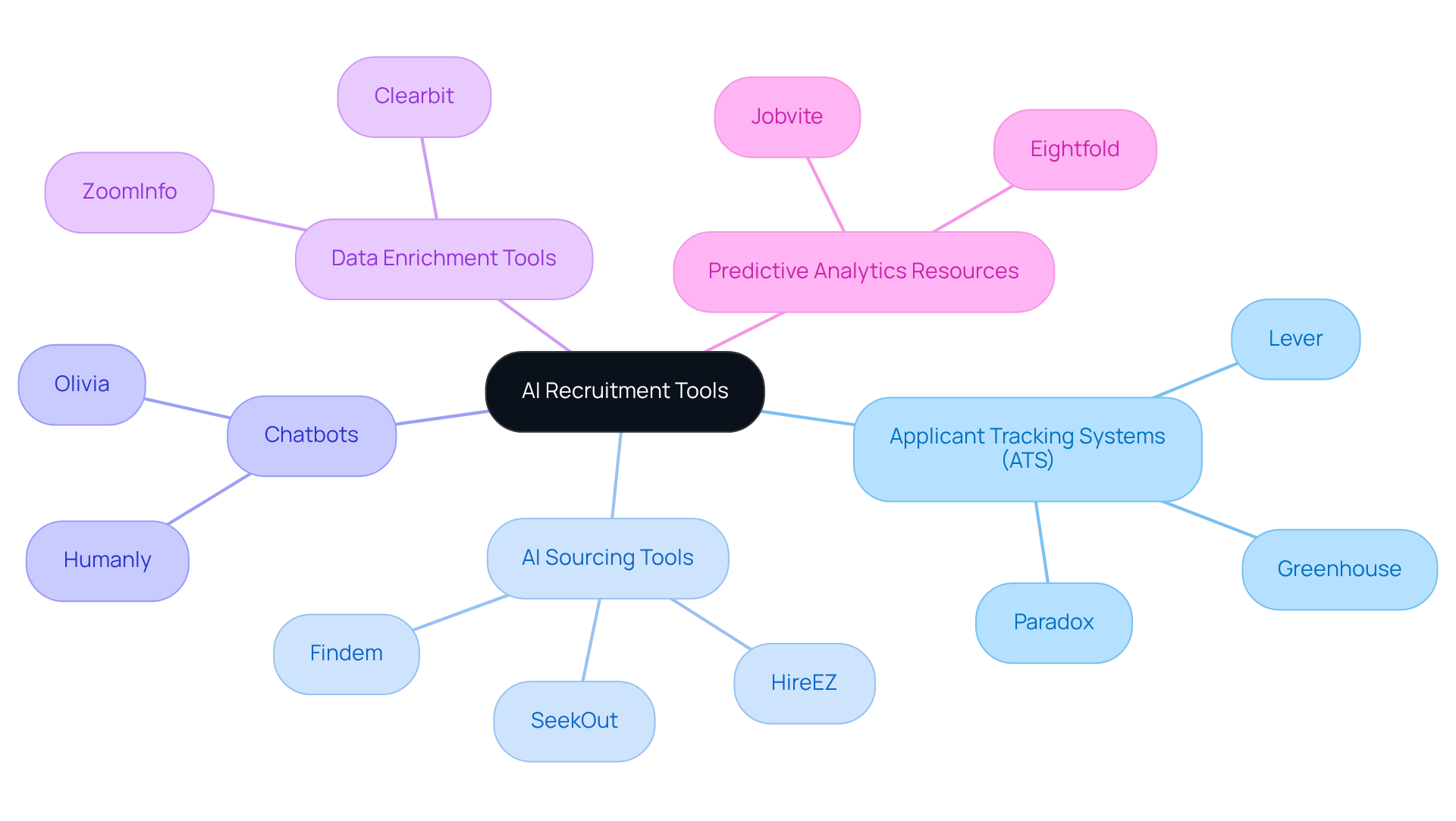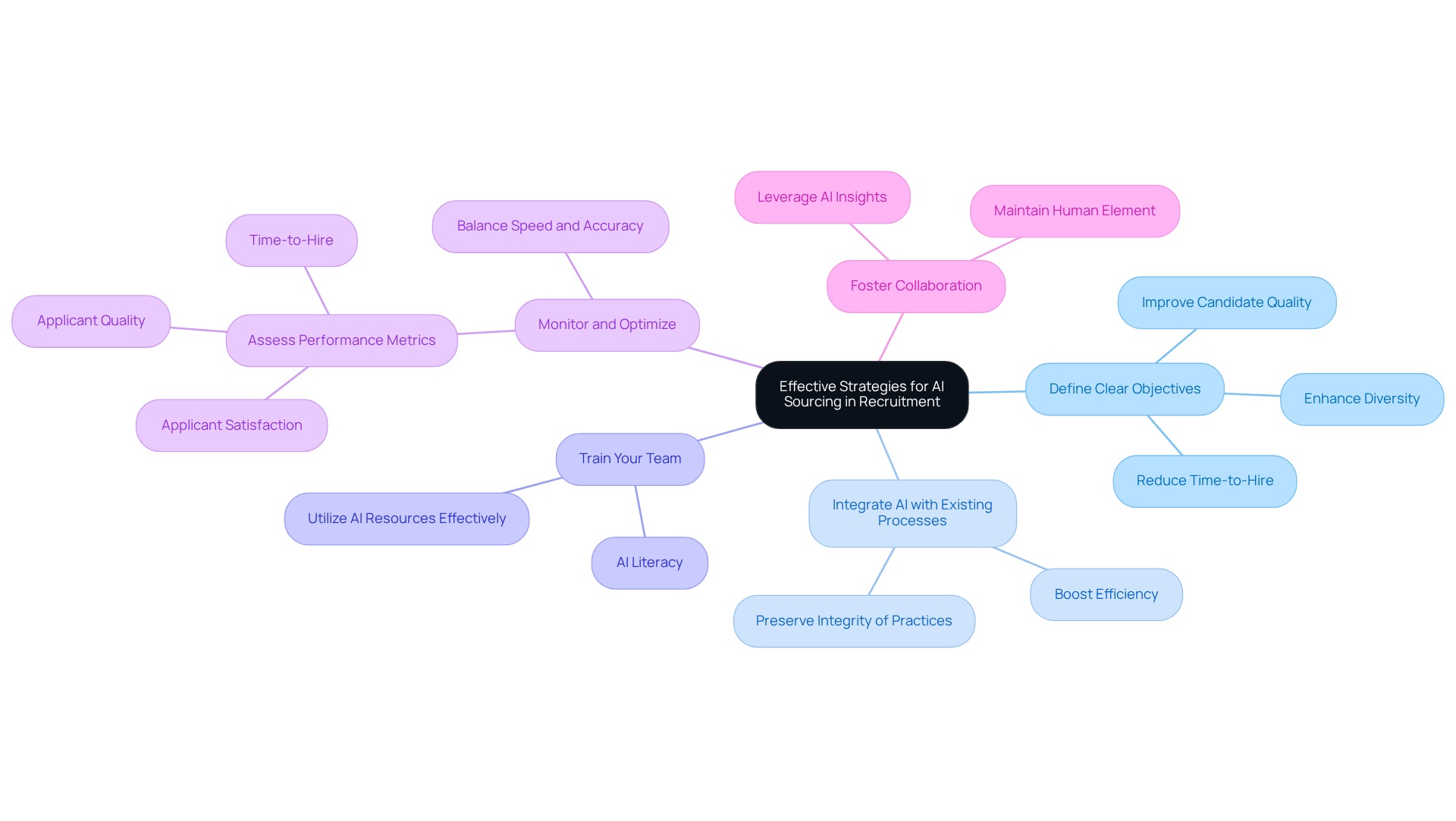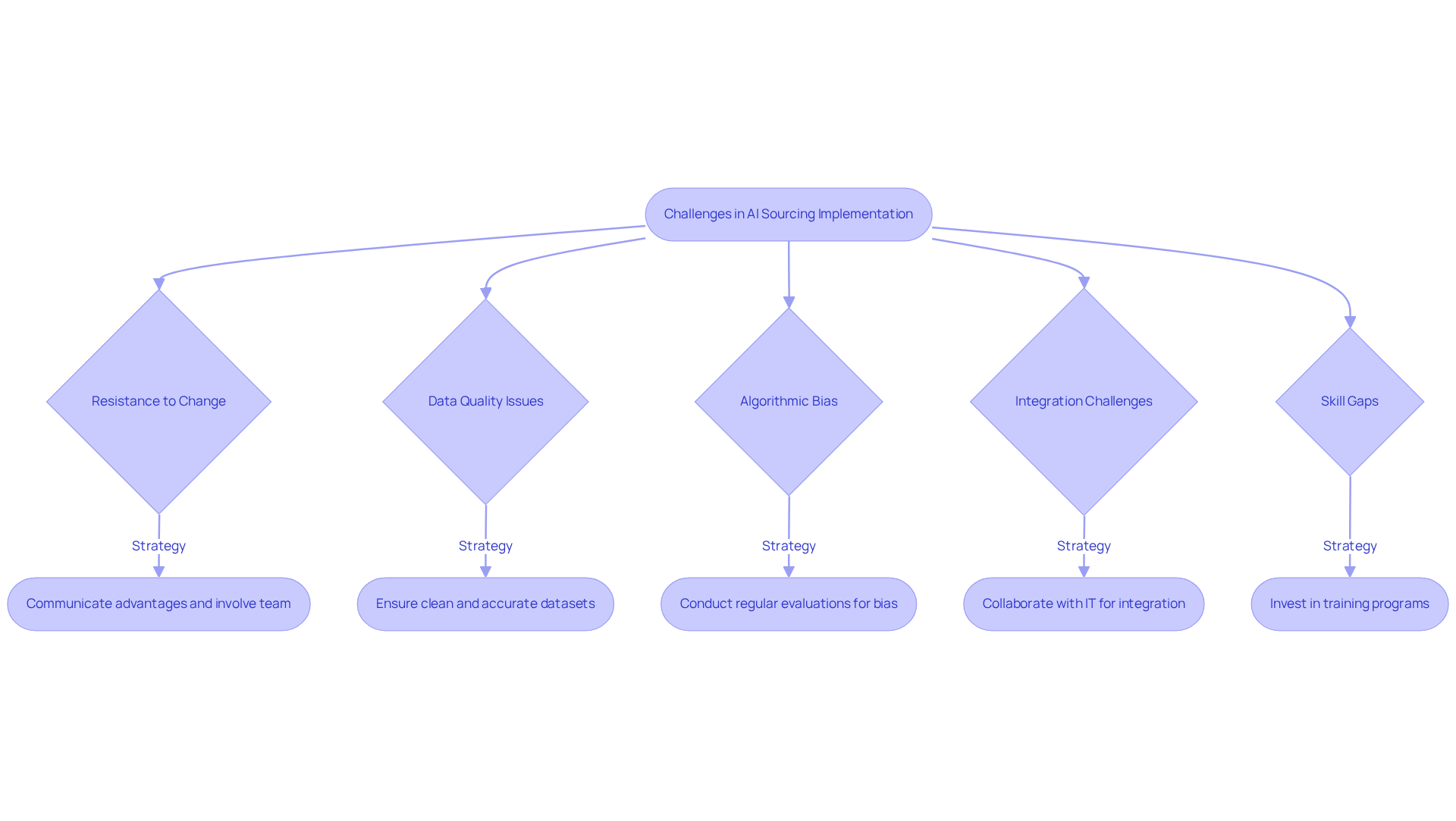Overview
This article delves into effective strategies for implementing AI sourcing in recruitment, showcasing its efficiency, precision, and capacity to mitigate bias. By highlighting the advantages of AI technologies—such as accelerated candidate identification and enhanced candidate experiences—it establishes a compelling case for their adoption. However, it does not shy away from addressing the challenges organizations face, including resistance to change and data quality issues, which must be navigated to successfully implement these strategies.
The benefits of AI in recruitment are clear. Organizations can streamline their hiring processes, resulting in quicker placements and improved experiences for candidates. Yet, to realize these advantages, companies must confront the hurdles that come with innovation. How can they foster a culture receptive to change? What measures can be taken to ensure data integrity? These are critical questions that require thoughtful consideration.
Ultimately, successful adoption of AI sourcing strategies hinges on a balanced approach—leveraging technology while addressing human factors. By doing so, organizations can position themselves at the forefront of recruitment innovation, ensuring they attract the best talent in a competitive landscape.
Introduction
Harnessing the power of artificial intelligence in recruitment is no longer a futuristic concept; it is a reality reshaping how organizations find and engage talent. AI sourcing empowers recruiters to streamline processes, enhance candidate experiences, and reduce biases, ultimately leading to superior hiring outcomes.
As the landscape evolves, what are the most effective strategies for implementing AI sourcing successfully? How can teams overcome the inherent challenges of this technology?
This article explores essential tools, techniques, and best practices that will enable recruiters to master AI sourcing and maintain a competitive edge in the hiring arena of 2025.
Understand AI Sourcing and Its Importance in Recruitment
AI procurement harnesses artificial intelligence technologies to revolutionize the hiring process. By employing algorithms and machine learning, it enables recruiters to locate, connect with, and assess potential applicants far more efficiently than traditional methods. The significance of AI sourcing in recruitment is profound:
- Efficiency: AI resources can analyze extensive datasets at remarkable speeds, allowing recruiters to identify suitable candidates in a fraction of the time required for manual searches. Organizations utilizing AI-driven recruitment tools have reported reductions in time-to-hire by over 30%, underscoring the transformative impact of these technologies.
- Precision: Advanced filtering techniques employed by AI ensure that applicants are matched to job descriptions with exceptional accuracy, allowing only the most qualified individuals to be considered. This precision is vital in a competitive talent landscape, where the right fit can significantly influence organizational success.
- Bias Reduction: AI plays a pivotal role in reducing unconscious bias in hiring processes by focusing on skills and qualifications rather than demographic factors. This shift not only fosters diversity but also enhances the overall quality of hires.
- Enhanced Candidate Experience: Automated communication and personalized outreach facilitated by AI significantly improve the candidate experience, making interactions more engaging and efficient. Companies that have integrated AI into their recruitment processes have observed application completion rates surge, with some reporting increases from 50% to 85%.
Understanding these aspects is crucial for recruiters aiming to implement effectively. The incorporation of AI not only streamlines workflows but also cultivates a more equitable and engaging hiring environment.

Explore Essential Tools and Technologies for AI Sourcing
To effectively leverage , recruiters must familiarize themselves with various resources and technologies that can significantly enhance their processes. Consider these essential tools:
- Applicant Tracking Systems (ATS): Modern ATS platforms, such as Greenhouse and Lever, integrate AI features to improve talent sourcing and screening, thereby increasing efficiency and reducing bias in the hiring process.
- AI sourcing tools, such as HireEZ and SeekOut, harness AI to identify and engage potential hires across multiple platforms, broadening recruitment efforts and ensuring a diverse talent pool.
- Chatbots: AI chatbots streamline initial interactions with applicants, efficiently addressing inquiries and scheduling interviews, which conserves valuable time for recruiters and enriches the applicant experience.
- Data Enrichment Tools: Platforms such as ZoomInfo and Clearbit augment applicant profiles with additional information, providing deeper insights into potential hires and facilitating more informed decision-making.
- Predictive Analytics Resources: These tools analyze historical hiring data to forecast future hiring needs and identify the most suitable candidates based on past successes, enabling organizations to proactively address talent shortages.
By exploring and integrating these tools, recruiters can refine their candidate acquisition strategies, enhance overall efficiency, and adapt to the evolving hiring landscape in 2025.

Implement Effective Strategies for AI Sourcing in Recruitment
To effectively implement AI sourcing in recruitment, consider these targeted strategies:
- Define Clear Objectives: Establish specific goals for AI sourcing, such as reducing time-to-hire, improving candidate quality, or enhancing diversity. Companies that adopt skills-based hiring, for instance, have seen a 12% increase in quality hires, underscoring the significance of targeted objectives.
- Integrate AI with Existing Processes: Ensure that AI resources enhance your current hiring workflows. This integration not only boosts efficiency but also preserves the integrity of established practices, facilitating a seamless transition to AI-enhanced hiring.
- Train Your Team: Equip your recruitment team with the necessary training to utilize AI resources effectively. As AI technology evolves, organizations prioritizing AI literacy among their talent acquisition professionals will be better positioned to leverage these tools for strategic advantage.
- Monitor and Optimize: Continuously assess the performance of your AI sourcing strategies. Utilize , time-to-hire, and applicant satisfaction to refine your approach. In 2025, organizations will need to balance speed and accuracy in hiring decisions, making ongoing optimization essential.
- Foster Collaboration: Promote cooperation between recruiters and AI resources. Recruiters should leverage AI insights to inform their decisions while ensuring that the human element remains central in candidate interactions. This balance is vital, as AI tools can enhance the hiring process by automating administrative tasks, allowing recruiters to focus on building relationships with top talent.
By applying these strategies, recruiters can significantly enhance their hiring initiatives through efficient AI sourcing.

Overcome Challenges in AI Sourcing Implementation
Implementing AI procurement can significantly enhance recruitment processes; however, it also presents several challenges that teams must navigate. Here are key challenges and effective strategies to address them:
- Resistance to Change: Many team members may be reluctant to embrace new technologies. To mitigate this, clearly communicate the and involve team members in the decision-making process. Engaging them early fosters a sense of ownership and reduces apprehension. Notably, adopting new technologies often faces cultural resistance within organizations, stemming from fears of job displacement or mistrust in AI decisions.
- Data Quality Issues: The effectiveness of AI systems hinges on the quality of the data they employ. Ensure that your datasets are clean, accurate, and current before deploying AI solutions. Regular data audits help maintain high standards and improve the reliability of AI outputs. Importantly, 47% of companies view SaaS data silos as a significant adoption blocker for AI in hiring, underscoring the necessity of addressing data quality.
- Algorithmic Bias: AI systems can unintentionally reinforce biases found in their training data, leading to unfair hiring practices. Conduct regular evaluations of your AI systems to recognize and rectify any biases, ensuring a just hiring process that encourages diversity and inclusion. This vigilance is vital, as one of the most pressing issues with AI in hiring is the potential for algorithms to perpetuate existing biases.
- Integration Challenges: Combining AI resources with current recruitment systems can be intricate and may require considerable modifications. Collaborate closely with IT teams to facilitate seamless integration, ensuring that all systems function harmoniously and enhance overall efficiency. For instance, General Motors faced challenges screening and scheduling interviews for 1-2 million annual candidates, which they addressed through strategic AI integration.
- Skill Gaps: Recruiters may lack the necessary skills to effectively utilize AI tools. Invest in comprehensive training and development programs to equip your team with the knowledge and skills needed to leverage AI effectively in hiring. Ongoing training for HR professionals on the latest AI technologies is crucial for keeping skills up to date and ensuring effective use of AI.
By proactively addressing these challenges, recruitment teams can successfully implement strategies for AI sourcing, leading to improved efficiency and better hiring outcomes.

Conclusion
AI sourcing signifies a transformative shift in recruitment practices, harnessing advanced technologies to enhance efficiency, precision, and candidate experience. By integrating artificial intelligence into hiring processes, organizations can streamline their efforts and cultivate a more equitable recruitment environment, ultimately leading to superior hiring outcomes.
The article underscores several pivotal benefits of AI sourcing, including its capacity to swiftly analyze large datasets, improve candidate matching, mitigate bias, and enhance communication with applicants. It also delineates essential tools and technologies that bolster AI recruitment, such as:
- Applicant Tracking Systems
- AI sourcing tools
- Chatbots
- Predictive analytics resources
To maximize the advantages of AI in recruitment, implementing effective strategies—like defining clear objectives and fostering collaboration between AI and human recruiters—is crucial.
As the recruitment landscape continues to evolve, embracing AI sourcing is not merely beneficial; it is essential for organizations striving to maintain competitiveness. By proactively confronting challenges such as resistance to change, data quality issues, and algorithmic bias, recruiters can effectively harness the power of AI to refine their hiring processes. The future of recruitment resides in the strategic integration of AI, and organizations prioritizing these advancements will be better positioned to attract and retain top talent.
Frequently Asked Questions
What is AI sourcing in recruitment?
AI sourcing refers to the use of artificial intelligence technologies to enhance the hiring process, enabling recruiters to locate, connect with, and assess potential applicants more efficiently than traditional methods.
How does AI sourcing improve efficiency in recruitment?
AI can analyze extensive datasets at remarkable speeds, allowing recruiters to identify suitable candidates much faster. Organizations using AI-driven recruitment tools have reported reductions in time-to-hire by over 30%.
What role does precision play in AI sourcing?
AI employs advanced filtering techniques to ensure that applicants are matched to job descriptions with exceptional accuracy, allowing only the most qualified individuals to be considered, which is crucial in a competitive talent landscape.
How does AI sourcing help reduce bias in hiring?
AI reduces unconscious bias by focusing on skills and qualifications rather than demographic factors, which fosters diversity and enhances the overall quality of hires.
What impact does AI sourcing have on the candidate experience?
AI facilitates automated communication and personalized outreach, significantly improving the candidate experience and leading to higher application completion rates, with some companies reporting increases from 50% to 85%.
Why is it important for recruiters to understand AI sourcing?
Understanding AI sourcing is crucial for recruiters aiming to implement effective AI strategies, as it streamlines workflows and cultivates a more equitable and engaging hiring environment.




